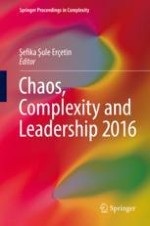2018 | OriginalPaper | Buchkapitel
31. Social Justice Leadership in Education in the Axis of the Chaos Theory Does Social Justice Arise From Chaos? Social Justice Leadership with Chaos Approach in Educational Organizations
verfasst von : İlknur Şentürk, Gökhan Kılıçoğlu
Erschienen in: Chaos, Complexity and Leadership 2016
Aktivieren Sie unsere intelligente Suche, um passende Fachinhalte oder Patente zu finden.
Wählen Sie Textabschnitte aus um mit Künstlicher Intelligenz passenden Patente zu finden. powered by
Markieren Sie Textabschnitte, um KI-gestützt weitere passende Inhalte zu finden. powered by
